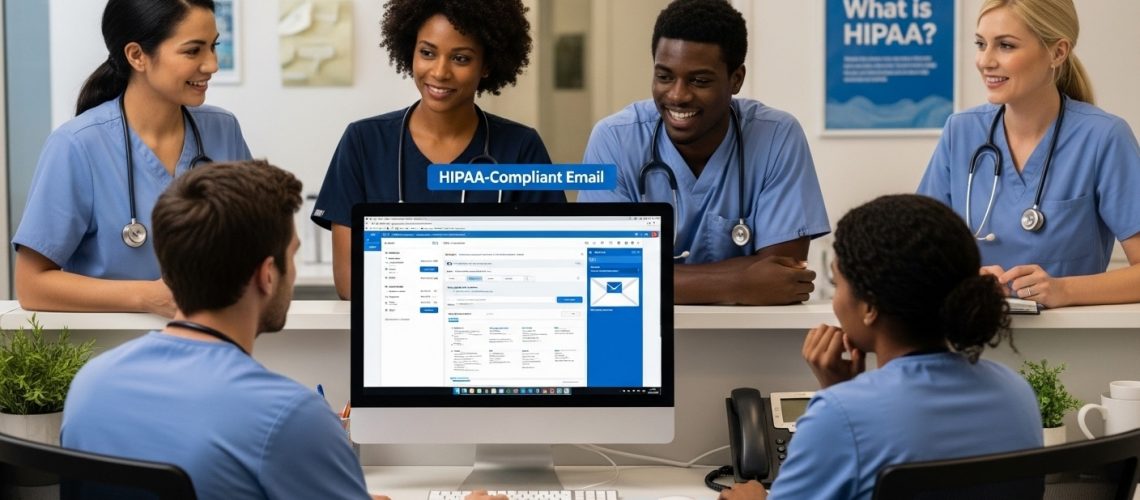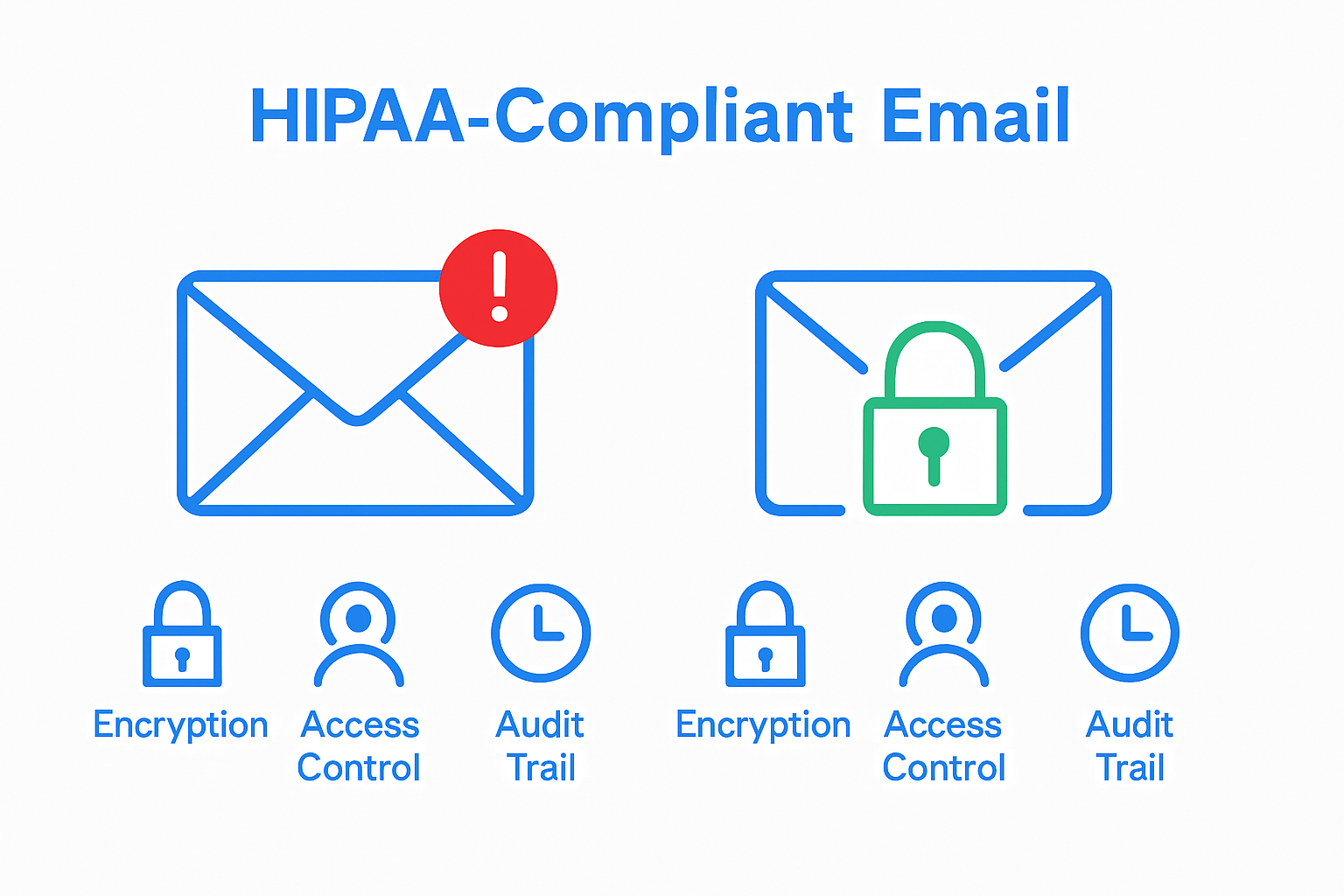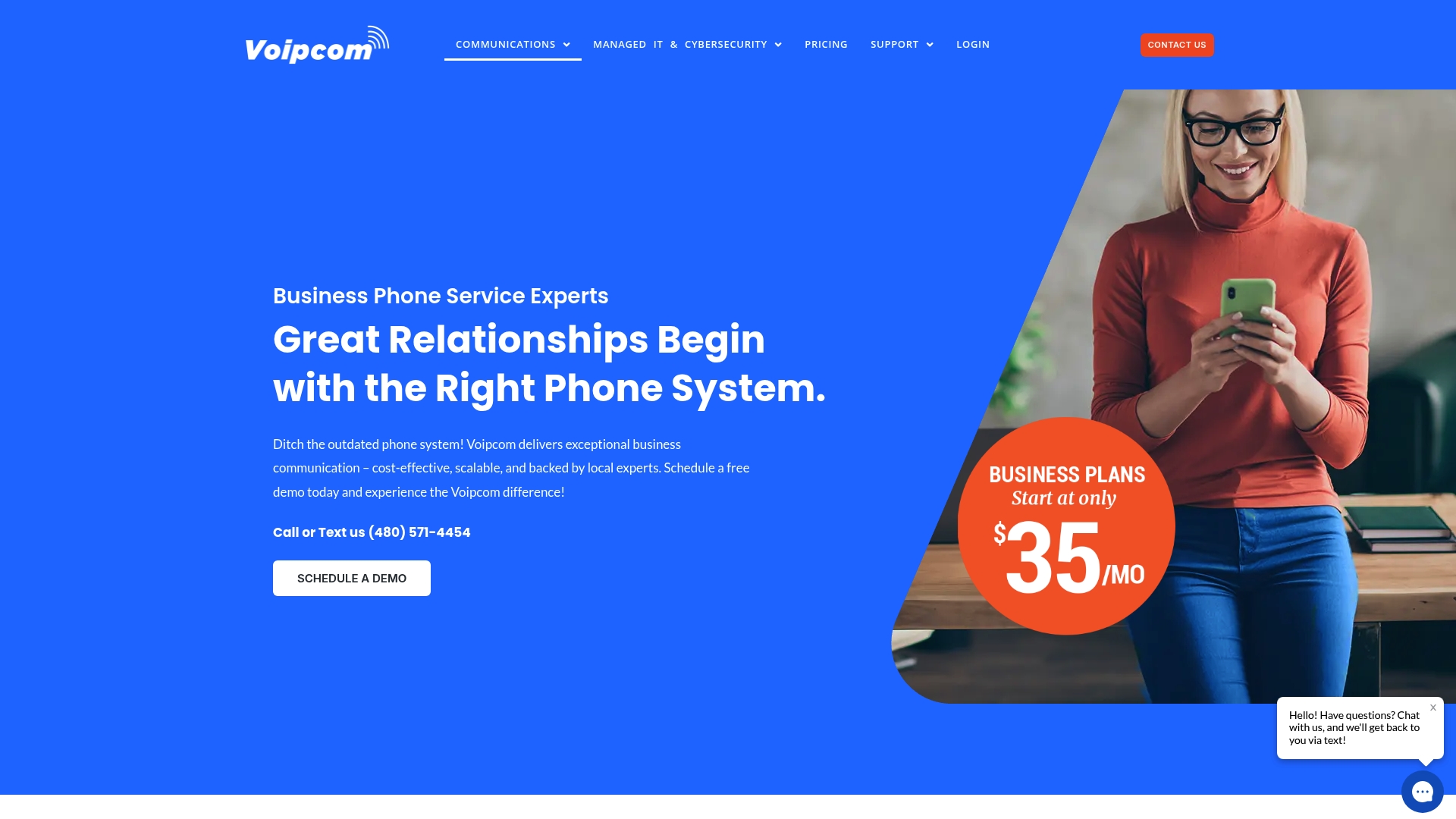Hospitals and clinics now send and receive thousands of emails every day carrying sensitive patient details. A single HIPAA violation can result in fines as high as $50,000 per incident. Most people assume using any email provider is good enough for healthcare communication. That is way off. Only specialized email systems meet the strict security standards needed to protect private health information and avoid devastating penalties.
Table of Contents
- Defining Hipaa-Compliant Email: Key Features And Standards
- The Importance Of Hipaa Compliance: Why It Matters
- How Hipaa-Compliant Email Works: Mechanisms Of Security
- Common Challenges And Solutions In Maintaining Compliance
- Real-World Applications: Hipaa-Compliant Email In Practice
Quick Summary
| Takeaway | Explanation |
|---|---|
| Implement strong encryption methods | Use end-to-end encryption to protect emails containing Protected Health Information (PHI). |
| Establish strict access controls | Utilize multi-factor authentication and role-based permissions to restrict data access. |
| Maintain detailed audit trails | Keep comprehensive logs of email interactions to track access attempts and secure communications. |
| Train staff on email security | Regularly educate healthcare employees about email compliance and security protocols. |
| Prioritize a culture of compliance | Foster an environment of respect for privacy to enhance patient trust and confidentiality. |
Defining HIPAA-Compliant Email: Key Features and Standards
HIPAA-compliant email represents a specialized communication method designed to protect sensitive patient health information during electronic transmission. Unlike standard email services, these solutions incorporate robust security measures that meet the stringent requirements of the Health Insurance Portability and Accountability Act (HIPAA).
Understanding Protected Health Information (PHI)
Protected Health Information encompasses any individually identifiable health data that could potentially reveal a patient’s identity. According to NCBI research, PHI includes critical personal details such as:
- Patient names
- Email addresses
- Phone numbers
- Biometric identifiers
- Facial photographs
- Medical record numbers
These specific data points require exceptional security protocols during electronic communication to prevent unauthorized access or disclosure.
Key Security Requirements for HIPAA-Compliant Email
Effective HIPAA-compliant email solutions must integrate multiple layers of security to ensure patient data protection. These comprehensive safeguards include:
- Encryption: Complete end-to-end encryption for all transmitted messages
- Access Controls: Strict user authentication and permission management
- Audit Trails: Detailed logging of all email interactions and access attempts
- Secure Storage: Encrypted storage mechanisms for archived communications
Mobile health technologies increasingly demand standardized electronic data security to maintain privacy and interoperability. Research demonstrates that without proper security standards, significant barriers emerge in healthcare communication and patient data management.
Healthcare organizations must implement comprehensive email security strategies that not only protect sensitive information but also enable seamless, efficient communication between medical professionals, administrators, and patients.
Below is a table summarizing the core security features required for HIPAA-compliant email and the specific role each plays in protecting patient information.
| Security Feature | Description |
|---|---|
| Encryption | Secures email content during transmission and storage |
| Access Controls | Limits email access to authorized users only |
| Audit Trails | Tracks and logs all email interactions and access attempts |
| Secure Storage | Ensures archived communications are protected with encryption |
| Multi-factor Authentication | Adds an extra layer of user identity verification |
| Role-based Permissions | Restricts information access based on user roles |
The Importance of HIPAA Compliance: Why It Matters
HIPAA compliance transcends mere regulatory obligation, representing a critical commitment to patient privacy, data security, and ethical healthcare communication. Healthcare organizations must recognize compliance as a fundamental aspect of maintaining patient trust and protecting sensitive medical information.
Legal and Financial Consequences of Non-Compliance
Failing to adhere to HIPAA regulations can result in severe repercussions for healthcare providers and organizations. The U.S. Department of Health and Human Services outlines potential penalties that can devastate healthcare practices:
- Monetary Fines: Ranging from $100 to $50,000 per violation
- Criminal Charges: Potential imprisonment for serious violations
- Reputation Damage: Loss of patient trust and potential organizational credibility
- Operational Restrictions: Potential limitations on future healthcare operations
Protecting Patient Trust and Confidentiality
HIPAA compliance serves as a critical mechanism for maintaining the sacred trust between patients and healthcare providers. By implementing robust privacy protections, organizations demonstrate their commitment to:
- Safeguarding personal health information
- Preventing unauthorized data access
- Ensuring transparent communication
- Maintaining patient dignity and autonomy
The Centers for Disease Control and Prevention emphasizes that national privacy standards are essential for fostering patient confidence and enabling effective public health interventions. Healthcare providers who prioritize compliance create environments where patients feel secure sharing sensitive medical information, ultimately improving overall healthcare outcomes.
Moreover, HIPAA compliance is not just about avoiding penalties but about creating a culture of respect, privacy, and ethical data management.
This table compares the legal and financial consequences of failing to comply with HIPAA requirements against the benefits of maintaining patient trust and confidentiality.
| Aspect | Non-Compliance Consequences | Compliance Benefits |
|---|---|---|
| Financial Impact | Fines from $100 up to $50,000 per violation | Reduces risk of costly regulatory penalties |
| Legal Ramifications | Possible criminal charges, operational limits | Demonstrates legal and ethical responsibility |
| Patient Relationships | Loss of trust and damage to reputation | Strengthens patient confidence and loyalty |
| Data Security | Increased risk of data breaches | Better protection of patient information |
| Public Health Outcomes | Potential barriers to effective communication | Supports safer, effective healthcare interventions |
| By integrating comprehensive security protocols, healthcare organizations protect not only individual patient information but also contribute to the broader ecosystem of responsible healthcare communication. |
How HIPAA-Compliant Email Works: Mechanisms of Security
HIPAA-compliant email operates through sophisticated security mechanisms designed to protect sensitive patient information during electronic communication. These advanced systems go beyond traditional email services by implementing multiple layers of protection that ensure data confidentiality, integrity, and controlled access.
Encryption: The Primary Defense Mechanism
Encryption serves as the foundational security strategy for HIPAA-compliant email. According to the U.S. Department of Health and Human Services, covered entities must implement robust encryption protocols to protect electronic Protected Health Information (e-PHI) during transmission. This process involves transforming readable data into a complex code that can only be deciphered by authorized recipients with specific decryption keys.
Key encryption techniques include:
- End-to-End Encryption: Securing messages from sender to recipient
- Transport Layer Security (TLS): Protecting data during network transmission
- Advanced Encryption Standard (AES): Utilizing 256-bit encryption protocols
Access Control and Authentication Protocols
Beyond encryption, HIPAA-compliant email systems integrate stringent access control mechanisms to prevent unauthorized data access. These security measures require multiple verification steps to ensure that only authorized personnel can view sensitive information.
Authentication protocols typically involve:
- Multi-factor authentication
- Unique user credentials
- Role-based access restrictions
- Comprehensive user activity logging
Healthcare organizations must implement comprehensive security strategies that not only protect individual patient records but also maintain the integrity of electronic communication systems. By combining advanced encryption, robust authentication, and continuous monitoring, HIPAA-compliant email solutions create a secure environment for sharing sensitive medical information.
Common Challenges and Solutions in Maintaining Compliance
Healthcare organizations face numerous complex challenges when implementing and maintaining HIPAA-compliant email systems. Successfully navigating these obstacles requires a proactive, strategic approach that addresses both technological and human factors in information security.
Identifying Potential Email Security Vulnerabilities
Yale University’s HIPAA guidelines reveal critical vulnerabilities that healthcare providers must anticipate and mitigate. These potential risks include:
- Accidental misaddressing of sensitive emails
- Potential unauthorized email interception
- Inadvertent disclosure of Protected Health Information (PHI)
- Insufficient verification of recipient identities
Healthcare professionals must develop comprehensive strategies that address these vulnerabilities through systematic technological and procedural interventions. Understanding potential weak points is the first step in creating robust security protocols.
Training and Organizational Culture
Effective HIPAA compliance extends far beyond technological solutions. Organizations must cultivate a culture of privacy awareness and continuous education. This involves:
- Regular staff training on email security protocols
- Implementing clear communication guidelines
- Developing consistent reporting mechanisms for potential breaches
- Creating accountability frameworks for information handling
Successful compliance requires transforming security from a technical requirement into an organizational mindset. Healthcare providers must empower employees with knowledge, tools, and a clear understanding of their critical role in protecting patient information.
Ultimately, maintaining HIPAA email compliance is an ongoing process that demands vigilance, adaptability, and a comprehensive approach to data protection.

Real-World Applications: HIPAA-Compliant Email in Practice
HIPAA-compliant email solutions transform theoretical security guidelines into practical, operational strategies that healthcare organizations can implement across various communication scenarios. These real-world applications demonstrate how robust email security protects patient information while maintaining efficient professional workflows.
Secure Communication Strategies in Healthcare Settings
The University of Minnesota provides an exemplary model of implementing comprehensive HIPAA-compliant email protocols. Their approach illustrates how organizations can integrate advanced security measures into everyday communication processes:
- Establishing specific Business Associate Agreements (BAA)
- Restricting access to sensitive applications
- Enforcing secure mobile device configurations
- Prohibiting third-party email clients for PHI transmission
These strategic implementations demonstrate that HIPAA compliance is not about creating barriers but about designing intelligent, flexible communication frameworks that protect sensitive information while enabling seamless professional interactions.
Device and Access Management
Effective HIPAA-compliant email requires meticulous device and access management. Healthcare organizations must establish clear protocols that govern how electronic Protected Health Information (ePHI) can be accessed, transmitted, and stored. Critical considerations include:
- Mandatory device passcode requirements
- Restricted use of personal devices for professional communication
- Comprehensive user authentication protocols
- Regular security audits and access reviews
By implementing these rigorous management strategies, healthcare providers can create secure communication ecosystems that balance technological convenience with stringent privacy protections. The goal is not to impede communication but to ensure that every interaction maintains the highest standards of patient confidentiality and data security.
Protect Patient Privacy and Simplify Compliance With Voipcom
Are you worried about accidental leaks of sensitive patient information when using email? The article underscored how small mistakes and security gaps can put Protected Health Information (PHI) at risk, leading to severe penalties and lost patient trust. As healthcare teams embrace new technology, secure communication and defending against HIPAA violations are more urgent than ever.
Do not leave your HIPAA compliance to chance. Experience the peace of mind of fully managed, secure HIPAA-compliant email and messaging with Voipcom. We combine advanced encryption, strong access controls, and local live support to help your staff focus on patient care instead of regulations. Lower risk, protect trust, and keep your business ahead.
Connect with our experts to see how Voipcom streamlines all your technology and compliance needs. Explore our cloud-based phone and managed IT solutions for your clinic or practice today.
Frequently Asked Questions
What is HIPAA-compliant email?
HIPAA-compliant email refers to specialized email systems that protect sensitive patient health information in compliance with the Health Insurance Portability and Accountability Act (HIPAA) standards.
Why is HIPAA compliance important in healthcare?
HIPAA compliance is crucial as it safeguards patient privacy, protects sensitive medical information, and maintains the trust between patients and healthcare providers. Non-compliance can lead to significant legal and financial penalties.
What security features are essential for HIPAA-compliant email?
Essential security features include end-to-end encryption, strict access controls, audit trails for monitoring email interactions, and secure storage for archived communications to protect patient information.
How can healthcare organizations ensure staff are trained in HIPAA email compliance?
Healthcare organizations can ensure staff training by implementing regular education programs focused on email security protocols, clear communication guidelines, and accountability frameworks for handling sensitive information.




